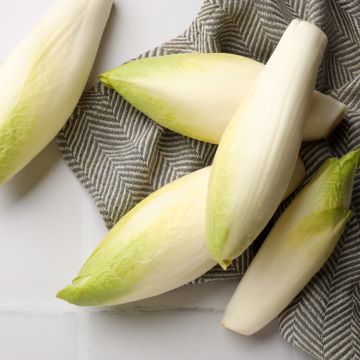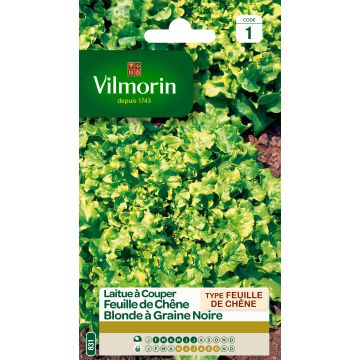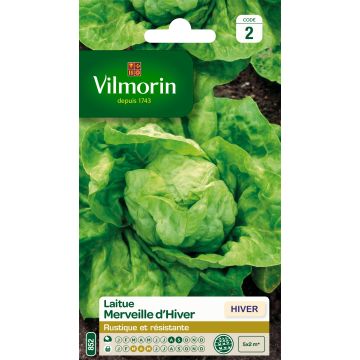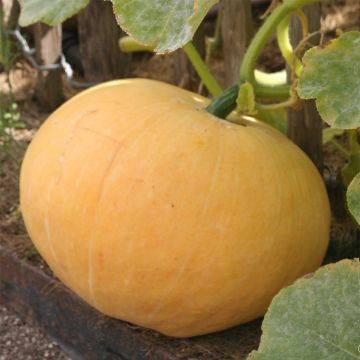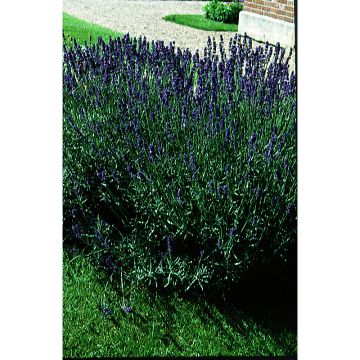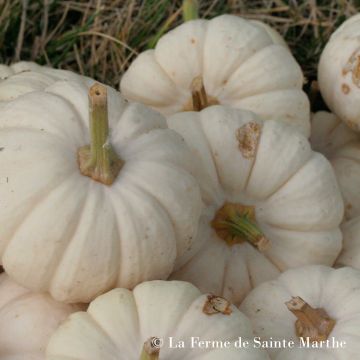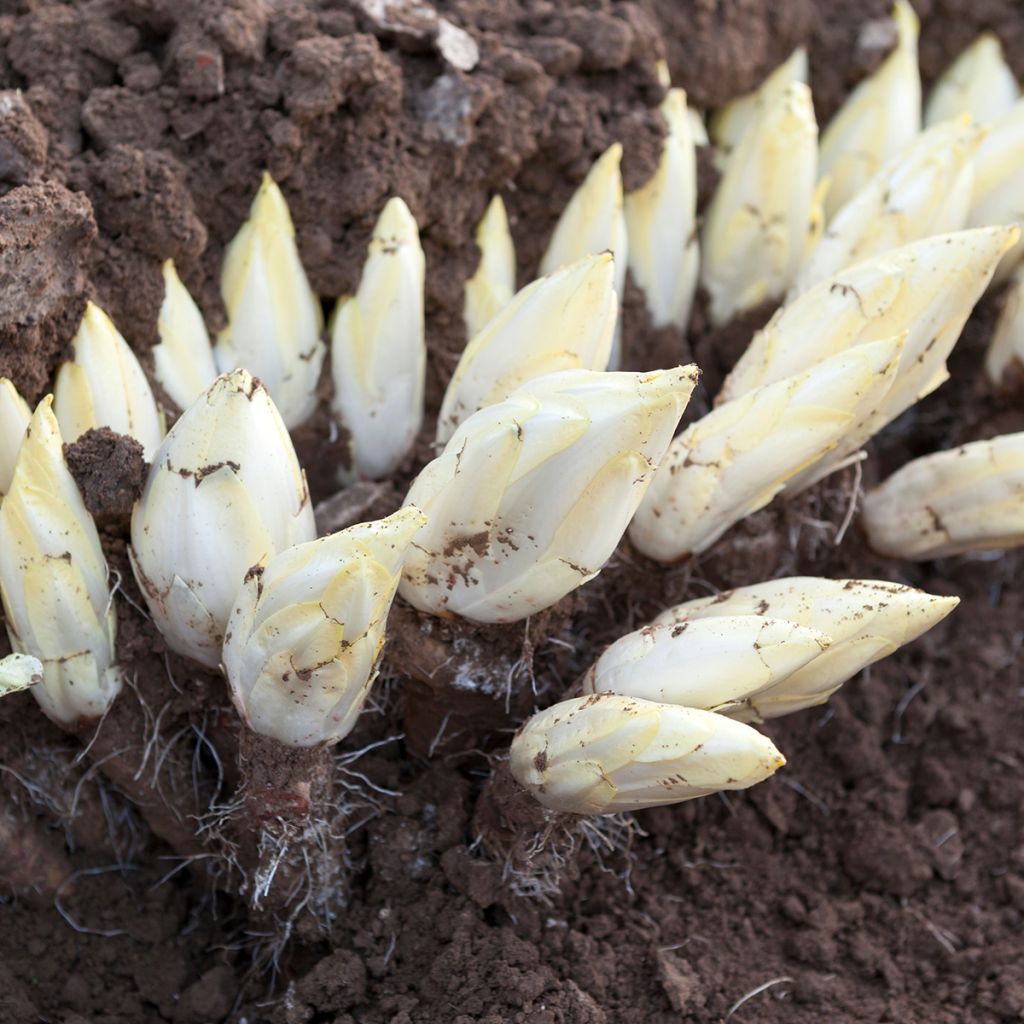

Chicory Witloof Flash F1 seeds - Cichorium intybus
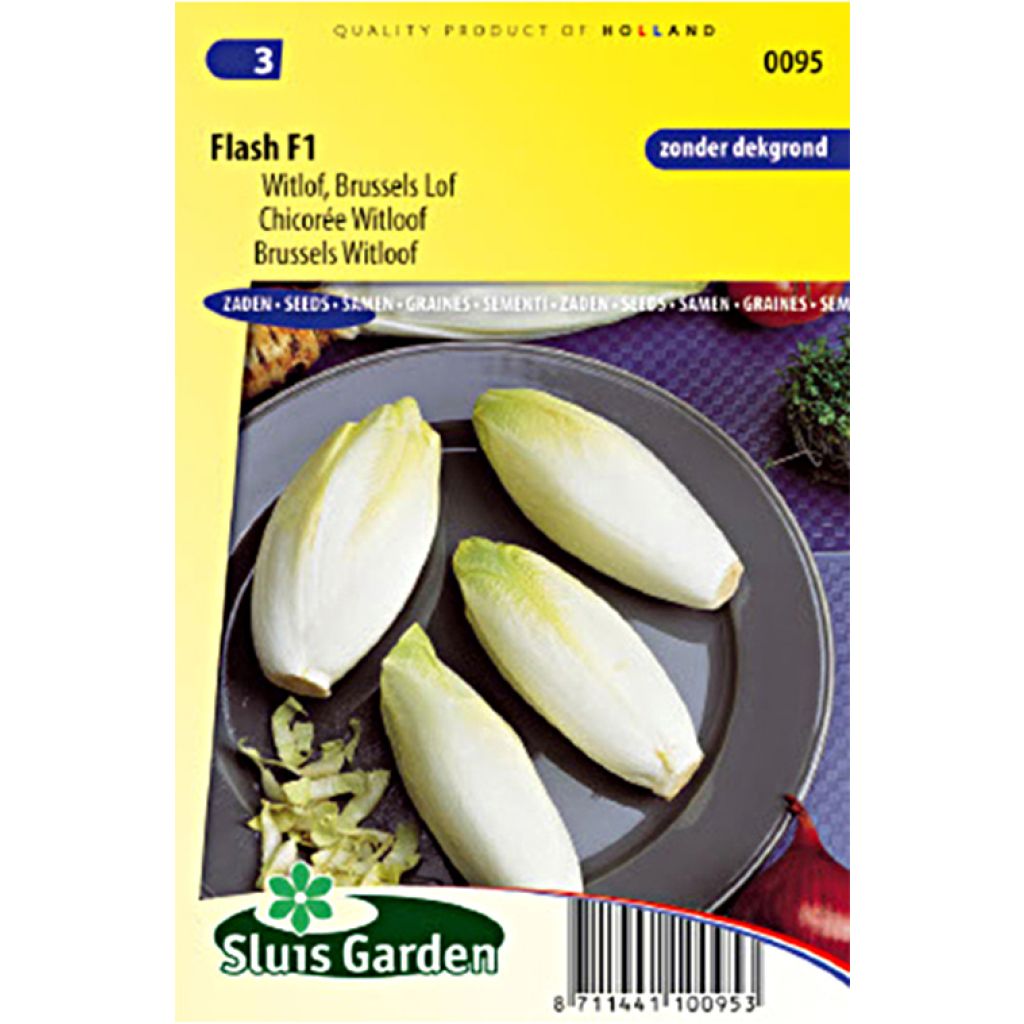

Chicory Witloof Flash F1 seeds - Cichorium intybus
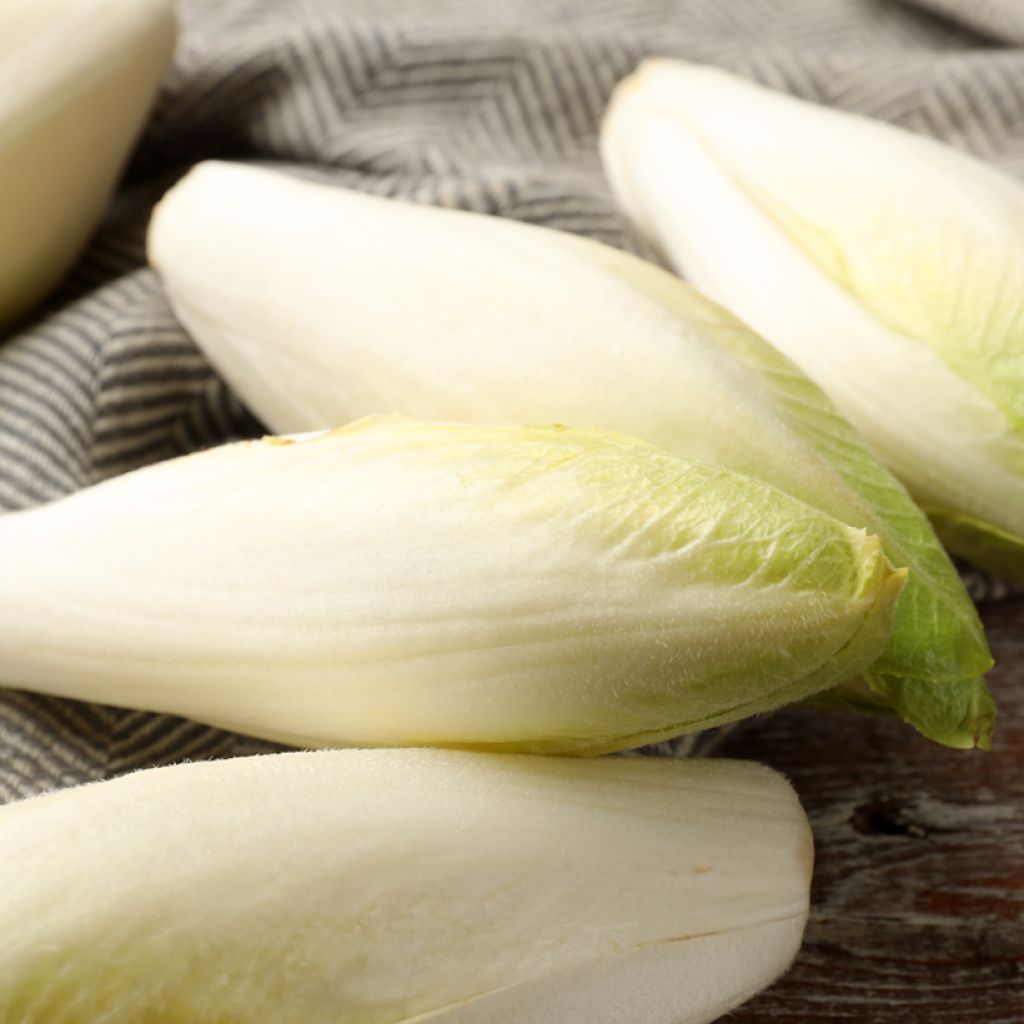

Chicory Witloof Flash F1 seeds - Cichorium intybus
Chicory Witloof Flash F1 seeds - Cichorium intybus
Cichorium intybus var. latifolium Witloof Flash F1
Chicon, Belgian endive, Witlof
no significant harvest RESPONSE FROM PROMESSE DE FLEURS: We are truly sorry as we place great importance on the quality of our plants and their growth. If you encounter any issues, please do not hesitate to contact our customer service at 03.61.76.08.10 or by email: serviceclient@prromessedefleurs.com and we will proceed with a replacement or refund if necessary.
jean michel colliou, 04/10/2016
Special offer!
Receive a €20 voucher for any order over €90 (excluding delivery costs, credit notes, and plastic-free options)!
1- Add your favorite plants to your cart.
2- Once you have reached €90, confirm your order (you can even choose the delivery date!).
3- As soon as your order is shipped, you will receive an email containing your voucher code, valid for 3 months (90 days).
Your voucher is unique and can only be used once, for any order with a minimum value of €20, excluding delivery costs.
Can be combined with other current offers, non-divisible and non-refundable.
Why not try an alternative variety in stock?
View all →This plant carries a 6 months recovery warranty
More information
We guarantee the quality of our plants for a full growing cycle, and will replace at our expense any plant that fails to recover under normal climatic and planting conditions.
Description
'Flash F1' Witloof chicory is an early-maturing, productive hybrid variety. The firm heads can be forced outdoors in the vegetable garden or in a cellar. Delicious eaten raw in salads or braised. Sow from May to June and harvest 5 months later.
Witloof chicory (Cichorium intybus foliosum) is a herbaceous plant that belongs to the Asteraceae family. It is commonly named chicon, Belgian endive or endive. However, true endives belong to a closely related species, Cichorium endivia. The most common cultivated forms are escarole and “frisée” (curly) endive.
Witloof differs from other cultivated forms of chicory in that it is grown in three stages: first it sown outdoors in spring; in Autumn, the plants are lifted, the leaves are trimmed off and the roots are stored in sand; they are finally forced in a cool, dark place until firm, tight heads form and are ready to be harvested (approximately 3 weeks later).
Although this may seem like a tedious crop to grow, it is very rewarding! The beautiful white heads have a distinctive bitter taste that is delicious eaten both raw and cooked. They are fabulous chopped up in a salad with walnuts, blue cheese and a drizzle of honey dressing. In France, chicory heads are traditionally baked whole in bechamel sauce. Witloof has numerous health benefits, including boosting the immune system, easing digestion and reducing inflammation.
Harvesting: roots are lifted in October-November and stored in sand until forcing. For longer harvests, forcing can be staggered.
Storage: witloof chicory stores well in a cool, dark place. It is often sold wrapped in blue paper to protect the blanched leaves from the light.
Good to know: hoeing and weeding around your plants regularly will help keep the weeds in check. Mulching is a great way to keep the soil moist, especially during dry spells.
NB: This variety is marked F1 for "F1 hybrid" meaning that its qualities are derived from carefully selected parent plants. This results in a variety that is both full of flavour and resistant to diseases. Sometimes criticised or wrongly assimilated to GMOs, F1 hybrid seeds have the advantage of producing reliable, uniform, disease-resistant plants. Unfortunately, these qualities will not be passed on to following generations.
Report an error about the product description
Harvest
Plant habit
Foliage
Botanical data
Cichorium
intybus var. latifolium
Witloof Flash F1
Asteraceae
Chicon, Belgian endive, Witlof
Cultivar or hybrid
Biennial
Planting and care
Sowing:
In May, sow lightly in shallow flat-bottomed drills, about 5 cm wide and 2 cm deep. Leave 30 cm between each row. Cover the seeds lightly and water. Germination takes about 8 days. Thin out the seedlings, keeping one every 15 cm. If necessary, they can be transplanted when the seedlings reach the 7-8 leaf stage.
Care:
To avoid diseases such as downy mildew or leaf spot, weed and hoe around your plants regularly and make sure to rotate your crops every 3 to 4 years. Mulching is a great way to keep the soil moist, especially during dry spells.
Forcing:
In October-November, lift the witloof plants. Keep only those with roots that measure over 4 cm in diameter. Trim off the leaves about 1 cm above the collar (the base of the leaves). Place the prepared roots in a sand-filled container in a sheltered place until they are ready for forcing. For harvests all winter long, force the plants in batches every fortnight. Place the roots side by side in forcing trays filled with sand. Keep away from the light. Room temperature needs to be around 8 to 10°C (a cellar is ideal). It is also possible to force the plants outdoors. Choose a sheltered spot and dig a trench about 1,20 m wide and 25 cm deep. Place the roots in the trench and cover with 10 cm of potting compost followed by 10 cm of compost. Cover with a layer of straw and plastic sheeting. The heads are ready to be harvested about 4 weeks later, when they are roughly 15 cm long.
Seedlings
Care
Intended location
-
, onOrder confirmed
Reply from on Promesse de fleurs
Similar products
Haven't found what you were looking for?
Hardiness is the lowest winter temperature a plant can endure without suffering serious damage or even dying. However, hardiness is affected by location (a sheltered area, such as a patio), protection (winter cover) and soil type (hardiness is improved by well-drained soil).

Photo Sharing Terms & Conditions
In order to encourage gardeners to interact and share their experiences, Promesse de fleurs offers various media enabling content to be uploaded onto its Site - in particular via the ‘Photo sharing’ module.
The User agrees to refrain from:
- Posting any content that is illegal, prejudicial, insulting, racist, inciteful to hatred, revisionist, contrary to public decency, that infringes on privacy or on the privacy rights of third parties, in particular the publicity rights of persons and goods, intellectual property rights, or the right to privacy.
- Submitting content on behalf of a third party;
- Impersonate the identity of a third party and/or publish any personal information about a third party;
In general, the User undertakes to refrain from any unethical behaviour.
All Content (in particular text, comments, files, images, photos, videos, creative works, etc.), which may be subject to property or intellectual property rights, image or other private rights, shall remain the property of the User, subject to the limited rights granted by the terms of the licence granted by Promesse de fleurs as stated below. Users are at liberty to publish or not to publish such Content on the Site, notably via the ‘Photo Sharing’ facility, and accept that this Content shall be made public and freely accessible, notably on the Internet.
Users further acknowledge, undertake to have ,and guarantee that they hold all necessary rights and permissions to publish such material on the Site, in particular with regard to the legislation in force pertaining to any privacy, property, intellectual property, image, or contractual rights, or rights of any other nature. By publishing such Content on the Site, Users acknowledge accepting full liability as publishers of the Content within the meaning of the law, and grant Promesse de fleurs, free of charge, an inclusive, worldwide licence for the said Content for the entire duration of its publication, including all reproduction, representation, up/downloading, displaying, performing, transmission, and storage rights.
Users also grant permission for their name to be linked to the Content and accept that this link may not always be made available.
By engaging in posting material, Users consent to their Content becoming automatically accessible on the Internet, in particular on other sites and/or blogs and/or web pages of the Promesse de fleurs site, including in particular social pages and the Promesse de fleurs catalogue.
Users may secure the removal of entrusted content free of charge by issuing a simple request via our contact form.
The flowering period indicated on our website applies to countries and regions located in USDA zone 8 (France, the United Kingdom, Ireland, the Netherlands, etc.)
It will vary according to where you live:
- In zones 9 to 10 (Italy, Spain, Greece, etc.), flowering will occur about 2 to 4 weeks earlier.
- In zones 6 to 7 (Germany, Poland, Slovenia, and lower mountainous regions), flowering will be delayed by 2 to 3 weeks.
- In zone 5 (Central Europe, Scandinavia), blooming will be delayed by 3 to 5 weeks.
In temperate climates, pruning of spring-flowering shrubs (forsythia, spireas, etc.) should be done just after flowering.
Pruning of summer-flowering shrubs (Indian Lilac, Perovskia, etc.) can be done in winter or spring.
In cold regions as well as with frost-sensitive plants, avoid pruning too early when severe frosts may still occur.
The planting period indicated on our website applies to countries and regions located in USDA zone 8 (France, United Kingdom, Ireland, Netherlands).
It will vary according to where you live:
- In Mediterranean zones (Marseille, Madrid, Milan, etc.), autumn and winter are the best planting periods.
- In continental zones (Strasbourg, Munich, Vienna, etc.), delay planting by 2 to 3 weeks in spring and bring it forward by 2 to 4 weeks in autumn.
- In mountainous regions (the Alps, Pyrenees, Carpathians, etc.), it is best to plant in late spring (May-June) or late summer (August-September).
The harvesting period indicated on our website applies to countries and regions in USDA zone 8 (France, England, Ireland, the Netherlands).
In colder areas (Scandinavia, Poland, Austria...) fruit and vegetable harvests are likely to be delayed by 3-4 weeks.
In warmer areas (Italy, Spain, Greece, etc.), harvesting will probably take place earlier, depending on weather conditions.
The sowing periods indicated on our website apply to countries and regions within USDA Zone 8 (France, UK, Ireland, Netherlands).
In colder areas (Scandinavia, Poland, Austria...), delay any outdoor sowing by 3-4 weeks, or sow under glass.
In warmer climes (Italy, Spain, Greece, etc.), bring outdoor sowing forward by a few weeks.






























